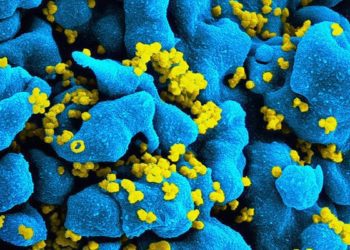Monoclonal antibody treatment does not improve outcomes in COVID-19-positive pregnant patients
1. Monoclonal antibody (mAb) treatment for mild to moderate coronavirus disease 2019 (COVID-19) in pregnant persons was not associated with a change in COVID-19-associated outcomes compared to usual care.
2. Treatment with mAb was also not associated with serious adverse reactions in this population.
Evidence Rating Level: 2 (Good)
Study Rundown: In some studies, mAb infusions, such as bamlanivimab and etesevimab, have reduced morbidity and mortality among patients infected with COVID-19. Although pregnancy has been found to be a risk factor for severe COVID-19 outcomes, the safety and efficacy of mAb treatments for pregnant persons infected with COVID-19 are unclear. This study was a retrospective cohort study of pregnant persons aged 12 and older who presented to an eligible outpatient care center with a positive COVID-19 test. It aimed to characterize the incidence of drug-related adverse events and to evaluate whether treatment with mAb was associated with a change in hospitalization or deaths. The study found that adverse reactions with mAb were rare and that mAb treatment was not associated with a change in COVID-19 outcomes, hospitalization, or obstetrical outcomes. However, further investigation into the study objectives may be required, as the retrospective nature of this study lends to significant recall bias and residual confounding. Symptom severity of COVID-19 was only documented for those receiving mAb, and adverse events may have been underreported. There were also several significant imbalances in baseline characteristics between the group which received mAb and the group which did not.
Click to read the study in AIM
In-Depth [retrospective cohort]: This retrospective study evaluated the safety and effectiveness of mAb treatments among pregnant persons with a documented COVID-19 infection between April 30, 2021 and January 21, 2022. Pregnant persons aged 12 and older who presented to a UPMC Health System care center as an outpatient within seven days of symptom onset were included. After applying selection criteria, 944 participants were included, of which 552 were found to have received mAb treatment. Results of the primary analysis found mild drug-related adverse events occurred in eight patients who were treated (1.4%) without the occurrence of a severe reaction. There was no difference in obstetric-associated outcomes between those who received mAb and those who did not. In terms of effectiveness, the propensity score-matched risk ratio for 28-days COVID-19 associated outcomes was 0.61 (95% Confidence Interval [CI], 0.34 to 1.1), and no difference in the propensity score-matched rates of non-COVID-19 related hospital admissions (risk ratio, 1.3; 95% CI 0.58% to 2.8%). At baseline, there were also significant differences between participants within the mAb treatment and non-treatment groups, namely that mAb patients were older, more likely to have private insurance, more likely to have a lower median area of deprivation index score, and more likely to be fully vaccinated against COVID-19. Overall, this study provided evidence that adverse events related to mAb treatment within this population were mild and rare. From an effectiveness standpoint, mAb did not show superior outcomes compared to mAb non-treatment.
Image: PD
©2022 2 Minute Medicine, Inc. All rights reserved. No works may be reproduced without expressed written consent from 2 Minute Medicine, Inc. Inquire about licensing here. No article should be construed as medical advice and is not intended as such by the authors or by 2 Minute Medicine, Inc.







